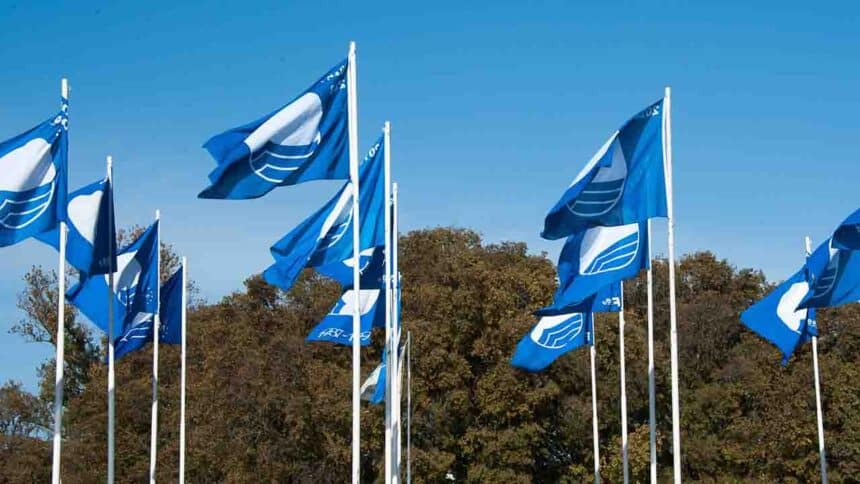Is second country in world with highest number of Blue Flag river beaches
Plumping for one of the coldest, windiest – and in some places very wet – days to make its announcement, the European Blue Flag Association has declared that Portugal this year will have nearly 400 Blue Flag beaches, eight more than it had in 2023.
The news came at the Vasco da Gama Aquarium in Dafundo, in the municipality of Oeiras, Lisbon district, from president of the European Blue Flag Association, José Archer, who said that 398 beaches will be flying the Blue Flag next season, spread over 103 municipalities.
A Blue Flag beach fulfils several criteria, including the quality of the water and space (planning), safety and services, surveillance and raising people’s awareness (environmental education).
He considered it ‘good news’ that the number of beaches, marinas and boats with Blue Flags ‘has grown again’, pointing out that the number of beaches is “about to reach 400”.
José Archer also emphasised the “continuous growth of inland beaches”, admitting that they are “naturally much more sensitive, more difficult to achieve and maintain”.
“Portugal stands out enormously in terms of inland beaches. We’re the second country in the world with the most inland [river] beaches, with 49, more than twice as many as Spain and Italy – a figure that deserves to be emphasised”, he added.
Regarding venues that may have lost a Blue Flag this year, José Archer explained that all the situations took into account the quality of the water. In the case of Zambujeira do Mar, it relates to the impact of the summer festival taking place in the south-west Alentejo town, in the municipality of Odemira, in the district of Beja.
When it comes to river beaches no longer flying the Blue Flag, he stressed it is enough for there to be an accident or spill upstream for water quality to be impacted.
“These are one-off situations, which is a shame because they end up not being able to hoist the Blue Flag for a year, but it is also a warning to people’s behaviour that sometimes a reckless attitude leads to a community’s efforts going down the drain”, he told his audience.
At an international level, Portugal ranks second in terms of ecotourism vessels awarded Blue Flags: 23 – and 19 marinas – have also been awarded this year, two more than last year.
But while Blue Flags have now been decided, it will take another month before they are flying: the first official ceremony scheduled to take place at Fontinha coastal beach in Porto Santo, Madeira, on June 1.
The first river beach due to fly its Blue Flag will be Agroal, Ourém, in the district of Santarém, on June 7, while the first marina will be Porto de Recreio da Calheta, Madeira, with the flag being hoisted on May 31.
Coastal and river beaches are spread across the North (with 89 making two more than last year), Centre (48, one more than last year), Tejo (75, one less), Alentejo (38, one less), Algarve (86, one more), Azores (45, one more) and Madeira (17, one more).
The Blue Flag Programme is an education programme for sustainable development, promoted in Portugal by the European Blue Flag Association, the Portuguese branch of the Foundation for Environmental Education.
Each year’s bathing season is defined in a decree published in the Diário da República, which identifies bathing waters and the definition of the respective season, which at national level runs from May 1 to October 30, with life guard cover generally only beginning on June 1.
Source material: LUSA


























